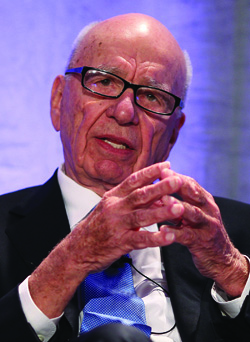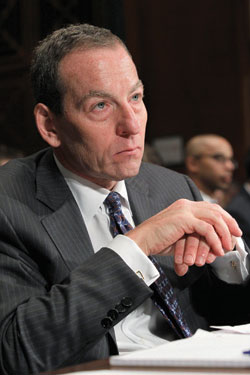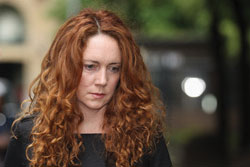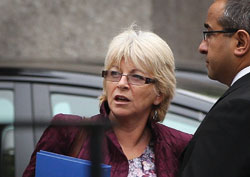Foreign Exchanges: Rupert Murdoch, Embattled in the UK, Grapples with US Bribery Law

Illustration by Matt Mahurin
When the U.S. Department of Justice announced the arrest of 22 executives in 2010 for violations of the Foreign Corrupt Practices Act, it was highlighting more than the “SHOT Show,” an elaborate sting aimed at kickbacks paid by corporate officials. The government was also heralding a new dawn in FCPA enforcement, which for years had been aimed almost exclusively at corporations while letting their human decision-makers slide.
Prosecutors attached the moniker SHOT Show to the case because nearly all the defendants were arrested at a Las Vegas shooting, hunting and law enforcement trade convention of the same name, where they landed in an FBI-orchestrated operation to secure bribes on a fake $15 million contract to outfit an African nation’s presidential guard.
But two years later, after a series of setbacks before a skeptical judge and a series of reluctant juries, the new dawn has faded quickly under clouds of calculated criticism, political saber-rattling and academic attack. Two trials ended in hung juries, three defendants were acquitted, and federal Judge Richard J. Leon ruled that prosecutors would no longer be able to tie the defendants together in a far-flung conspiracy.
In February, the Wall Street Journal denounced the SHOT Show cases as “creative prosecutions” designed to “stretch the law into a far more blunt instrument” than the FCPA was ever intended to be.
“Instead of going after clear violations, the vague statute has become a tool to prosecute or threaten legions of companies,” the Journal said.
The Journal criticism, however consistent with its long-standing editorial philosophy, does not come without irony. Its parent company and the company’s titular leader, media mogul Rupert Murdoch, are at the forefront of a full-throttle campaign to change the FCPA at a time when he and his company are seen as targets of potential enforcement. Though not charged with crimes, Murdoch’s Delaware-registered News Corp. has spent the last year trying to survive allegations that reporters and editors at Murdoch’s newspapers in the United Kingdom had hacked telephones and bribed police officers and other public officials to unearth sleaze and scandal involving celebrities, politicians and even ordinary British citizens.
In addition to possible Foreign Corrupt Practices Act violations, prosecutors in the United States are investigating whether News Corp. hacked the phones of 9/11 victims’ families. In an effort to buy silence, since the mid-2000s U.S. subsidiaries of News Corp. also have paid more than $650 million to opponents or purchased their companies for far more than they were worth to settle suits by competitors accusing the subsidiaries of engaging in unfair trade practices, partly by hacking computers and “smart cards,” which are used to access satellite television services.
Shareholders also have sued in Delaware Chancery Court, claiming the litigation and Murdoch’s iron-fisted control over News Corp.’s board endanger their investments. And the advocacy group Citizens for Responsibility and Ethics in Washington has asked the Federal Communications Commission to revoke Murdoch’s 27 Fox broadcast licenses for violations of the agency’s “good character” requirement for holders.

Rupert Murdoch hopes to weaken the FCPA, as he and his company are seen as potential targets for enforcement. Photo by Justin Sullivan/Getty Images.
Indeed, a U.K. parliamentary investigation in May concluded that Murdoch “is not a fit person to exercise the stewardship of a major international company,” declaring that Murdoch, his son James, News Corp. and its subsidiary News International showed “willful blindness” to the problem. Earlier in the year, lead Scotland Yard investigator Sue Akers told the parliamentary inquiry that one Murdoch paper—the Sun—operated in a “culture … of illegal payments” that created systems to pay the bribes and hide the identities of officials receiving them.
BRIBERY OR JUST BUSINESS?
Both statements might be red meat for a U.S. prosecutor trying to make an FCPA prosecution against an executive, even one who might not be directly involved. And although some authorities on this side of the Atlantic question whether he or his businesses violated the FCPA, Murdoch wants the law changed. And he has allies. The U.S. Chamber of Commerce and 33 other professional and trade organizations have proposed amendments that would allow an affirmative defense for corporate defendants that can prove by a preponderance of the evidence that they had in place adequate plans to comply with the FCPA before they were charged. Other proposals would use the lack of a satisfactory plan as an element of the crime, meaning it would have to get past a grand jury and at least one judge before jurors get a crack.
Other chamber-backed proposals to curtail the FCPA include:
• Limiting a corporation’s criminal successor liability for prior violations by a company it has acquired. The chamber also would limit civil liability for actions by a subsidiary without the parent’s knowledge.
• Adding a “willfulness” requirement for corporate culpability to prevent the government from criminally charging a corporation for acts it didn’t know were illegal or even wrong. The standard currently applies only to individuals.
• Clarifying the definition of “foreign official” to reduce the uncertainty corporations can encounter when dealing with state-owned businesses and their employees. The chamber says the problem is particularly vexing in China, where the state fully or partly owns most companies.
“This is something that concerns our members across the board,” says chamber spokesman Bryan E. Quigley. “It affects companies anywhere. It affects decisions where they do and do not do business.”
Justice Department officials say the proposals would emasculate the law. They may have headed off potential legislation last year, however, by promising to revise the department’s enforcement guidelines to help companies stay within the law.
While critics say the Foreign Corrupt Practices Act is bad for business, Justice officials say it’s really bribery that’s bad. They suggest bribery can be a symptom of a more widespread disease.
“Bribes are rarely paid only once,” former Justice Department FCPA enforcement chief Greg D. Andres told the House Judiciary Subcommittee on Crime, Terrorism and Homeland Security in June 2011. “Companies and executives that pay bribes often rely on loose controls and poor accounting, which promote corporate instability and permit other crimes, such as embezzlement and antitrust violations, to flourish—all to the detriment of shareholders and the marketplace.”
Department officials only will say they expect to complete the revisions “this year” and decline to say what the content might be. But they’re not ready for a legislative fix.

Lanny Breuer: “You have to prosecute individuals. ….It can’t just be a matter of imposing fines on companies.” AP Photo/J.Scott Applewhite
“I do believe that on the whole we prosecute the FCPA vigorously and fairly,” says Lanny A. Breuer, who presides over Justice’s FCPA policy as the assistant attorney general in charge of the department’s Criminal Division. “The FCPA is no different than any other area of the criminal law. We’re enforcing it under the same factors as we do in other areas of the law.”
As it does in considering any charges against business organizations, the department weighs, among other factors, the gravity of the offense, including the risk of harm to the public; the extent of the wrongdoing; and complicity by management and history of similar misconduct, including prior criminal, civil and regulatory infractions.
Though the law considers corporations people in some situations, corporations can’t go to prison. But the humans who cause them to act can do time.
“You just cannot prosecute companies; you have to prosecute individuals,” Breuer insists. “It can’t just be a matter of imposing fines on companies.”
THE SLEEPING STATUTE
In October 2011, Miami telecommunications executive Joel Esquenazi was sentenced to 15 years in prison for his part in a scheme that raised nearly $900,000 to bribe officials at Haiti’s state phone company. Indeed, prosecutions of individuals increased from six in 2002 to a record 42 in 2009, then tailed off to 24 by 2011.
“We’re going to continue to bring cases that are righteous and good,” Breuer says. “But there will never be a guarantee that we will always prevail or that every judge is going to look at our cases in the same way.”
FCPA enforcement wasn’t always that ambitious. Congress enacted the law in 1977 to halt what had become the ingrained practice of U.S. companies bribing foreign officials. In an investigation by the Securities and Exchange Commission, some 400 companies confessed to $300 million in questionable payments to foreign governments, politicians and political parties.
No sooner had President Jimmy Carter signed the act than it effectively became a dead letter, yielding only a couple of prosecutions a year. The anti-bribery provisions initially applied only to U.S. companies, citizens and residents, and to some foreign issuers of securities. Complaints soon arose that U.S. companies operating abroad lagged behind foreign competitors that regularly paid bribes and could even deduct them from taxes as business expenses in some countries.
Finally, in 1997 the United States joined 33 of its major trading partners in an agreement to enforce FCPA-style anti-bribery laws internationally. After 20 years of somnolence, it didn’t take long for the department to rouse the sleeping statute and plow resources into enforcement to obtain the needed proof from afar. Today the U.S. law’s reach is global, touching overseas subsidiaries of U.S. companies, as well as foreign companies and executives.
“The world is a smaller place, and an FCPA case is going to require foreign evidence,” Andres says.

Rebekah Brooks resigned as chief executive of News International in the wake of an alleged phone-hacking scandal. Photo by Dan Kittwood/Getty Images
With one piece of the enforcement puzzle in place, the corporate scandals in the early 2000s produced the second piece: the 2002 Sarbanes-Oxley Act, which requires issuers to evaluate their internal controls over financial reporting and sign off on them.
“If they have to qualify their disclosure, the government wants to know why,” says Shearman & Sterling partner Philip Urofsky, editor for the New York City firm’s digest of FCPA developments.
The developments in the law prompted prosecutors to reach for the stars. In 2002, the year Sarbanes-Oxley was enacted, Justice and the SEC initiated only two corporate cases. The number increased to 13 cases by 2007 before hitting a record-high 20 corporate actions in 2010. The agencies filed 16 in 2011.
“Success breeds success,” says Urofsky, a former Foreign Corrupt Practices Act prosecutor. “I was lucky to get one FBI agent. Now there’s a whole squad of FBI agents who do nothing but FCPA cases. You took the cases as you found them, and you did the best you could.”
DISCLOSURE AND COMPLIANCE
But the enforcement agencies’ bread and butter lies in voluntary disclosure of violations by potential defendants. While some white-collar crimes, such as price-fixing, almost by necessity involve active participation by corporate directors or officers, the FCPA can plunge expanding companies into the darker corners of the expanding global market-place, where they can’t control the conduct of others, they complain.
“From the business standpoint, what’s frustrating to companies is the uncertainty they face when moving into new countries,” says former prosecutor Andres.
Despite recent setbacks in criminal prosecution, FCPA cases have been a windfall for federal revenues. In 2010, the U.S. collected $1.8 billion in FCPA fines and costs; and though it was more modest in 2011, $508.8 million amounts to more than spare change.
Those numbers, however, don’t impress the U.S. Chamber of Commerce or its allies. In early April, they met with representatives from the enforcement agencies to discuss their differences. Neither side would disclose specifics, but spokesman Quigley says the chamber is willing to wait on Justice’s promised guidance before deciding whether to resume lobbying Congress.
“Then we’ll decide where to go from there,” he says. “But one thing is certain: We are committed to this issue. If it doesn’t happen this year and we feel it needs to be pursued some more, then we will pursue it.”
But as Wayne State University law professor Peter J. Henning cautions, supporters of a compliance defense shouldn’t expect too much from Justice. Henning expects federal prosecutors and regulators will get a boost from recent reports that Wal-Mart’s Mexican subsidiary paid millions in bribes for years for permits to build stores all across the country and hid the payments from the discount retailer’s headquarters in Arkansas.
“I think the DOJ will use the Wal-Mart allegations as a way of asking: ‘Do you really want to soften this law?’ ” predicts Henning, a former federal prosecutor.
Either legislation or revised guidance could rob prosecutors of the flexibility they currently enjoy.
“Guidance is a difficult issue for them because they don’t want to create a system that says if you do A, B and C, you’re in the clear,” Urofsky says.
The chamber wants a defense that would mirror factors for judging an adequate compliance program contained in the federal sentencing guidelines and the U.K.’s 2010 Bribery Act. They include regular evaluations of a company’s bribery risks; commitment by top management; due diligence in vetting parties to a business relationship; clear and practical policies and procedures readily accessible and enforceable throughout the company; and effective implementation, monitoring and review.

Sue Akers: Murdoch’s Sun newspaper fostered a culture that made illegal payments and concealed recipients’ identities. Photo by Peter MacDiarmid/Getty Images.
The British, however, added those elements to avoid the strict liability offense to an organization’s failure to prevent bribery. The FCPA isn’t a strict liability statute. Instead, the act operates under the similarly punitive doctrine of respondeat superior, where a company—despite its compliance efforts—is automatically liable if an employee violates the law, even if the employee acts alone and hides the deeds from others, including the company.
For the FCPA to nail them, defendants must act “willfully,” “knowingly” and “corruptly.” Companies claiming ignorance remain vulnerable because prosecutors don’t have to show actual knowledge, but rather simply that a company acted with “conscious disregard” or “willful blindness” to the illegal activity.
Moreover, U.S. prosecutors just don’t bite on theories that blame unwary corporations’ problems on so-called rogue employees operating along the edges, out of management’s sight. Companies are responsible for the conduct of those they hire, and that’s that, the government says. Prosecutors attach knowledge to corporate defendants by alleging they acted under willful blindness or conscious disregard of the risk of violations.
“The government will tell you what it thinks of the facts, and if you don’t like it, you can go to trial,” Urofsky says. “No company, unfortunately, wants to go to trial.”
Besides, the government says, compliance plans already figure in its charging decisions, settlement negotiations and sentencing. But amendment supporters predict more cases will go to trial if companies can present their plans to juries. Others find that prospect improbable.
Simply put, companies interested in protecting their bottom lines historically have determined that the costs of trial outweigh the benefits of settling with the government outside court. Aside from fines and legal costs, corporations convicted at trial leave court with the stigma of a criminal conviction that can turn into a public relations nightmare. And indictment alone can bar a company from contracting with the government, the equivalent of a corporate death penalty.
Today, almost no Foreign Corrupt Practices Act cases reach court. Instead, they end at the prosecutor’s office in deals where they admit wrongdoing but avoid charges.
The current practice of settling nearly all cases also has resulted in almost nonexistent case law governing the FCPA. But in the void, proponents of a compliance defense say prosecutors shouldn’t make the law.
CALLING THE FEDS’ BLUFF
A corporate defendant using a compliance defense faces the unenviable prospect of presenting testimony on the virtues of its program, then having prosecutors pick it apart on cross-examination. Jurors listening to that evidence may wonder how effective a plan is anyway if the company is in court for a violation it didn’t detect.
“That assumes the compliance plan is 100 percent effective,” Urofsky says. “It’s not. No compliance plan is.”
“We want Congress to tell us what the law is,” says former FCPA prosecutor T. Markus Funk, co-chair of the ABA Criminal Justice Section’s Global Anti-Corruption Task Force. He also represents convicted executive Esquenazi. “We don’t want enforcers telling us what their view of the law is.”
Although individuals have become more willing in recent years to go to trial and put the government to its proof, it wasn’t until last year that the government tried a corporate case to a guilty verdict. The results were disastrous in the end.
The government won the convictions against Lindsey Manufacturing Co., two executives and an intermediary in a scheme to bribe Mexican officials for contracts with a state-owned utility company. The bribes included a $300,000 Ferrari Spyder and a $1.8 million yacht.
But the government’s win over the Azusa, Calif., company soon withered. In December, District Judge A. Howard Matz tossed out the indictment and convictions, based on prosecutorial misconduct. The defendants accused the government of permitting an FBI agent to make false statements to the grand jury, using false statements to obtain search warrants, and failing to disclose exculpatory evidence. The government dropped its appeal in May without comment.
So other proponents of amending the FCPA would instead force the government to carry the load by including the absence of an adequate compliance program as an element of the crime. One is Southern Illinois University law professor Michael Koehler, publisher of a widely read blog on FCPA issues. He would take jurors out of the loop by allowing the court to decide the question as a matter of law.
“If DOJ is unable to establish an element of the crime, the case can’t go forward,” Koehler maintains. “An affirmative defense is essentially meaningless. There’s no reason for a company to risk indictment just to get an affirmative defense at trial.”
He envisions a process where defendants can challenge a grand jury’s findings on that element in a pretrial motion to dismiss.
Funk is studying the FCPA for possible action by the ABA Criminal Justice Section. He also would rein in prosecutors by taking the government out of the fact-finding business but would trust juries to rule on compliance plans.
“Courts interpret the law; juries find facts,” Funk says. “It’s a question of fact, not a question of law.” He notes that although an FCPA case can be extremely intricate, the system regularly calls on jurors to decide other equally complex matters. “They do that all the time.”



